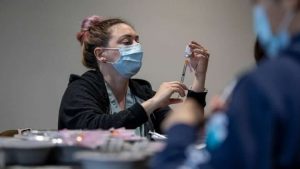Ontario on track to give 1st doses of COVID-19 vaccines to majority of adults this month: officials

Ontario is now on track to administer first doses of COVID-19 vaccines to 65 per cent of adults by the end of May, provincial health officials said Wednesday.
As of Tuesday evening, about 43 per cent of Ontarians aged 18 and older had received at least one shot.
“The light of the end of the tunnel grows brighter with every vaccine administered,” Health Minister Christine Elliott said during a press conference Wednesday.
Elliott again asked the public to continue to follow public health measures until the majority of Ontarians are vaccinated.
Health officials say delivery levels of the Pfizer-BioNTech vaccine are expected to ramp up again in late May, and stay consistent at more than 938,000 doses per week throughout June.
While pharmacies in the province were originally offering only doses of the AstraZeneca vaccine, both the Pfizer and Moderna vaccines are now being administered at some locations.
Select pharmacies in Peel and Toronto started offering the Pfizer vaccine at the end of April, while the Moderna vaccine will start being administered this week in up to 60 pharmacies spread through five public health units.
Officials anticipate that another 1,000 pharmacies provincewide will be ready to begin administering vaccines by the end of the week, bringing the total number in Ontario to roughly 2,500.
The province also says it is launching mobile vaccination units to help get vaccines to workers at small and medium-sized workplaces who can’t work from home in Peel, Toronto and York.
They will start running on May 7. Solicitor General Sylvia Jones these units will be operating at places like the Ontario Food Terminal, as well as Amazon and Loblaws locations.
Ford defends long-term care minister after report
Meanwhile, Premier Doug Ford is defending his minister of long-term care amid calls for her resignation after a report found Ontario’s nursing homes were neglected and unprepared for a pandemic.
Ford says he takes ultimate responsibility for the tragedies in long-term care and promised to fix the system.
He says he still has faith in Long-Term Care Minister Merrilee Fullerton, who has said the government is taking action to address problems in the sector.
His comments come nearly a week after the Ontario Long-Term Care COVID-19 Commission issued its report calling for an overhaul of the sector.
Opposition politicians expressed doubts on Thursday whether Ford or Fullerton have committed to necessary moves that would improve the system.
They noted that the government hasn’t committed to changes like permanent wage increases for personal support workers or other recommendations in the report.
NDP Opposition Leader Andrea Horwath said it was disappointing to hear Ford defend the minister.
Cases below 3K for second day
Meanwhile, Ontario reported another 2,941 cases of COVID-19 this morning, a second straight day below the 3,000 threshold, and 44 more deaths from the illness.
The province hasn’t seen two consecutive days with fewer than 3,000 cases in more than a month.
The additional deaths are the most on a single day during the third wave of the pandemic, which began in early March. The official toll climbed to 8,187, while the seven-day average of deaths rose to 28.4.
The seven-day average of daily deaths reached its all-time peak of more than 60 in mid-January during the height of second wave.
Today’s new cases include 924 in Toronto, 565 in Peel Region, 254 in York Region, 171 in Durham Region and 149 in Hamilton.
The seven-day average of daily cases fell to 3,432, marking a full week of consistent declines.
Labs completed 45,767 tests for SARS-CoV-2, the virus that causes COVID-19, and Public Health Ontario logged a 6.6 per cent positivity rate, the lowest since March 31.
As for hospitalizations, as of Tuesday, there were 882 patients with COVID-related critical illnesses being treated in intensive care. Of those, 620 or about 70 per cent, required a ventilator to breathe.
Critical Care Services Ontario, a government agency that puts together internal reports for hospitals and health groups, said 52 more people were admitted to ICUs yesterday. Currently, the median age of critical care patients is 62 years old, and they tend to spend on average 11.8 days there.
A total of 2,744 patients have been sent to Ontario ICUs during the third wave.
Health Canada approves Pfizer for ages 12-15
This morning, Health Canada announced it had approved the Pfizer-BioNTech vaccine for use in adolescents aged 12 through 15.
Pfizer is the first product to be authorized for use in this younger age category. The three other products authorized for use in Canada — AstraZeneca, Johnson & Johnson and Moderna — can only be used in people over the age of 18, for now.
Health Canada said of the Pfizer vaccine that “efficacy in that age group is estimated to be 100% and is comparable to what is observed in adults,” while safety data shows it’s “well-tolerated.”
It’s unclear when children 12-15 in Ontario might receive the vaccine. At Wednesday’s press conference, Elliott called the move “wonderful news,” adding that discussions about this are underway.
“We are actively working through that right now,” she said.
Those same health officials also said they are monitoring research underway in England on whether or not people can mix and match the type of vaccine they receive for their first and second doses. Ontario’s stores of AstraZeneca vaccines, which have mostly been administered at pharmacies, are now mostly depleted.
The province is currently waiting to see when it may receive more.
COVID-19 among those vaccinated extremely rare, data shows
The latest data from Public Health Ontario (PHO) shows that COVID-19 cases among people who have been vaccinated have been exceptionally rare.
Of the almost 3.5 million people who were vaccinated in Ontario between December of last year and April 17 of this year, just 0.06 per cent (or 2,223 people) got infected after they had been partially or fully vaccinated.
The majority of those cases, PHO says, were found in people who were not yet fully protected by their vaccine, as their symptoms set in within two weeks of vaccination. Health experts say it can take weeks for a person’s immune system to properly build up an immunity to the virus.
Public health units in Ontario collectively administered 132,603 doses of COVID-19 vaccines yesterday, according to the Ministry of Health, the second-most ever on a single day in the province.
As of 8 p.m. yesterday, 5,599,723 people, or about 43 per cent of all adults in Ontario, had gotten at least one shot.
Ontario has administered about 84.5 per cent of the 6,625,735 doses it has received to date. Notably, 980,750 of those total doses arrived just yesterday or in the early morning hours today.








Redes Sociais - Comentários